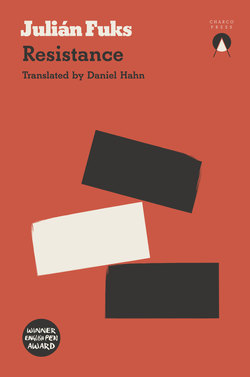Читать книгу Resistance - Julián Fuks - Страница 9
На сайте Литреса книга снята с продажи.
Оглавление3.
He’s adopted, that’s what I once said to a cousin when she insisted on pointing out how different we were, he and I, his hair darker and curlier than mine, his eyes so much lighter. I don’t think there was any malice or spite in my statement, I must have been about five years old – though if I now feel compelled to defend myself, perhaps I really was seized by some innocent cruelty which to this day I am still seeking to conceal. We were in a car being driven by my father, and my mother couldn’t have been with us because my brother was in the front seat, perhaps following our conversation, or perhaps lost in his own unfathomable thoughts. In an instant, there was silence. I might have been elbowed discreetly by my sister, who I imagine sitting beside me, or maybe the jab was merely the discomfort I felt upon realising I’d done something wrong, a discomfort I so often felt without anyone needing to elbow me. So bruising was the silence that I remember it to this day, among so many other silences that I can barely remember.
I’m not trying to absolve myself for my mistake when I say that in those days the guidance we received was ambiguous and vague. My brother had always known he was adopted, that was what my parents said, and it had always intrigued me, or intrigues me now: how to say something on that scale to a child who can barely manage the simplest words, how coldly or distantly to pronounce mummy, daddy, baby, adoption. How to convey the importance of that fact, with the seriousness the subject demands, without assigning it unnecessary weight, without transforming it into a burden the boy will never be able to carry? It was Winnicott who was dictating the steps we took – we followed a lot of what was suggested by Winnicottian theory, that’s what I would hear many years later, not quite understanding the term but aware of the plaintive tone, the distress in the voice. The fact of his knowing, of our knowing, of everyone who lived in the house knowing, was itself basic knowledge. And yet, somehow, this process was then put into reverse, a time coming when what had once been a word became unsayable, the truth silenced as though that might make it disappear. I don’t think it’s inaccurate to say that it was my brother who imposed on all of us the silence he found most comfortable, and we simply accepted it, so kind, and so cowardly.
In my memory, my brother’s eyes were filled with tears, but I suspect this is an invented detail, added later, on one of the first times I recalled the episode, already clouded by a certain remorse. He was sitting in the front seat. If he was crying, he certainly held back any sobs and hid his tears with his hands, or he turned his face to the window, let his eyes drift over presumed pedestrians. The point is, he wouldn’t look at me, he wouldn’t turn around. Maybe they were mine, those tear-filled eyes.
